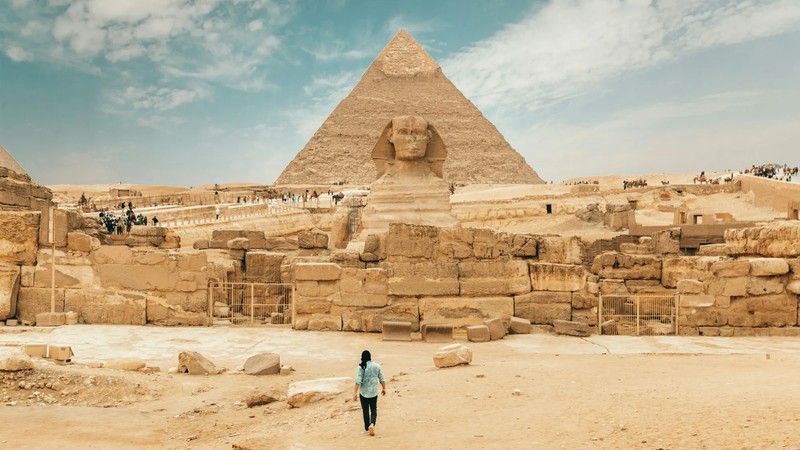Synopsis:Egypt’s tourism sector is witnessing an unprecedented transformation, moving beyond traditional pyramid tours to offer immersive eco-adventures and authentic cultural experiences. With digital innovations, simplified visa processes, and a focus on sustainable tourism, visitors can now explore hidden gems from the Red Sea’s coral reefs to traditional village homestays. Discover how Egypt’s ambitious tourism strategy is creating unique opportunities for modern travellers while preserving its rich heritage.
Oftentimes, when one imagines travelling to Egypt, it is easy for the Pyramids of Giza to be the first thought or a boat ride along the Nile River. But there is so much more to Egypt beyond Giza and its life-giving, nutrient-rich waters.
The Economic Power of Egyptian Tourism
In the 2023/24 FY, Egyptian tourism industry contributed approximately 12% of GDP, generating over $32.2 billion in revenue, and roughly employs about three million people. The number of international tourist arrivals reached a record of 15.7 million in 2024, surpassing the pre-pandemic levels, a great achievement. In the first quarter of 2025 the progress is projected to continue this upward trend with increased investments in infrastructure, airline capacity, and digital travel services. Egyptian tourism remains a major contributor to foreign currency income which is highly beneficial in increasing the local economy and its ability to stabilise inflation rates and improve the country’s trade position by reducing the cost of commodities.
Tourism’s Ups and Downs: Arab Spring to COVID-19
Egypt tourism has been on a constant wave of ebb and flow, through the 2000s, there was rapid growth in the sector but it reached a point of stagnation in the 2010s. The cause for this can be attributed to the 2011 Arab Spring which spread across major Arab states beginning in Tunisia, moving to Egypt, Syria, Libya and Yemen in response to political and economic stagnation; with limited human rights like freedom of speech or journalistic liberties. The protests sparked a revolution in Cairo causing the fall in visitors. In the years after the Arab Spring tourism increased consistently, only to be halted again by COVID-19. However, between 2020-2023, there has been an increase in tourists welcomed into Egypt with almost 12 million arrivals in 2022. By the end of 2023, there had been 15 million arrivals with a 33% increase in the first two quarters of the year! The Minister of Tourism Ahmed Issa, has stated that he is under the belief that the sector has an expected growth of another 20-30% growth with a goal of raising the number of visitors above 30 million by 2028.
Egypt’s New Tourism Strategy
The strategy which makes this possible is the New Tourism Strategy’s objective is to double the inbound tourism while also tripling the seat capacity of flights in and out of Egypt. Part of the plan is to encourage tourists to visit the different museums, landmarks and archaeological sites on offer. Ways this is being promoted is by making the travelling experience more enjoyable with varying convenient products; like self-cleaning toilets, QR codes, e-ticketing systems for excursions, or eco-friendly vehicles. Visiting Egypt has become a very tourist-friendly destination with the government relaxing visa policies/ processes by implementing visa waivers for some Western nations and availing e-visas as an option too. The digitisation of the process removes the risk of layers of difficult to work with red tape and streamlines the experience, thus making it more convenient.
Egyptian ecotourism: A New Way to Experience Egypt
Travelling to Egypt doesn’t need to be single-faceted filled with the same type/ form of experiences. Initiatives like ECO Egypt, partnered with and supported by the UNDP, aim to promote best practices in sustainable tourism by highlighting ecolodges, boosting the relevance and importance of ecological conservation and tourism. Egyptian ecotourism development in Egypt is promoting protected areas like the Red Sea coral reefs and providing diving centres, or the White Desert National Park or the Siwa Oasis. These locations open more avenues to touring Egypt extended beyond the pyramids by providing tourists with unique experiences.
Egyptian Cultural Tourism
Other exciting and enriching opportunities include community-based tourism allowing visitors to observe and engage with local communities in a manner that locals can benefit economically while preserving their Egyptian cultural heritage. This form of travel and experience can feature village homestays, guided eco-tours by locals or going to traditional crafts markets. There is a special experience in Egypt for all the curious-hungry travellers, picturesque big beaches, temples and the cradle of various ancient civilisations whether that be Greek, Roman, Coptic or Pharaonic. Egypt is the birthplace of advanced civilisations, a dynamic mix of art, foods, and a journey of significant spiritual and religious heritage for Muslims, Christian and Jews. A vast depth of culture and history are yet to be explored.








